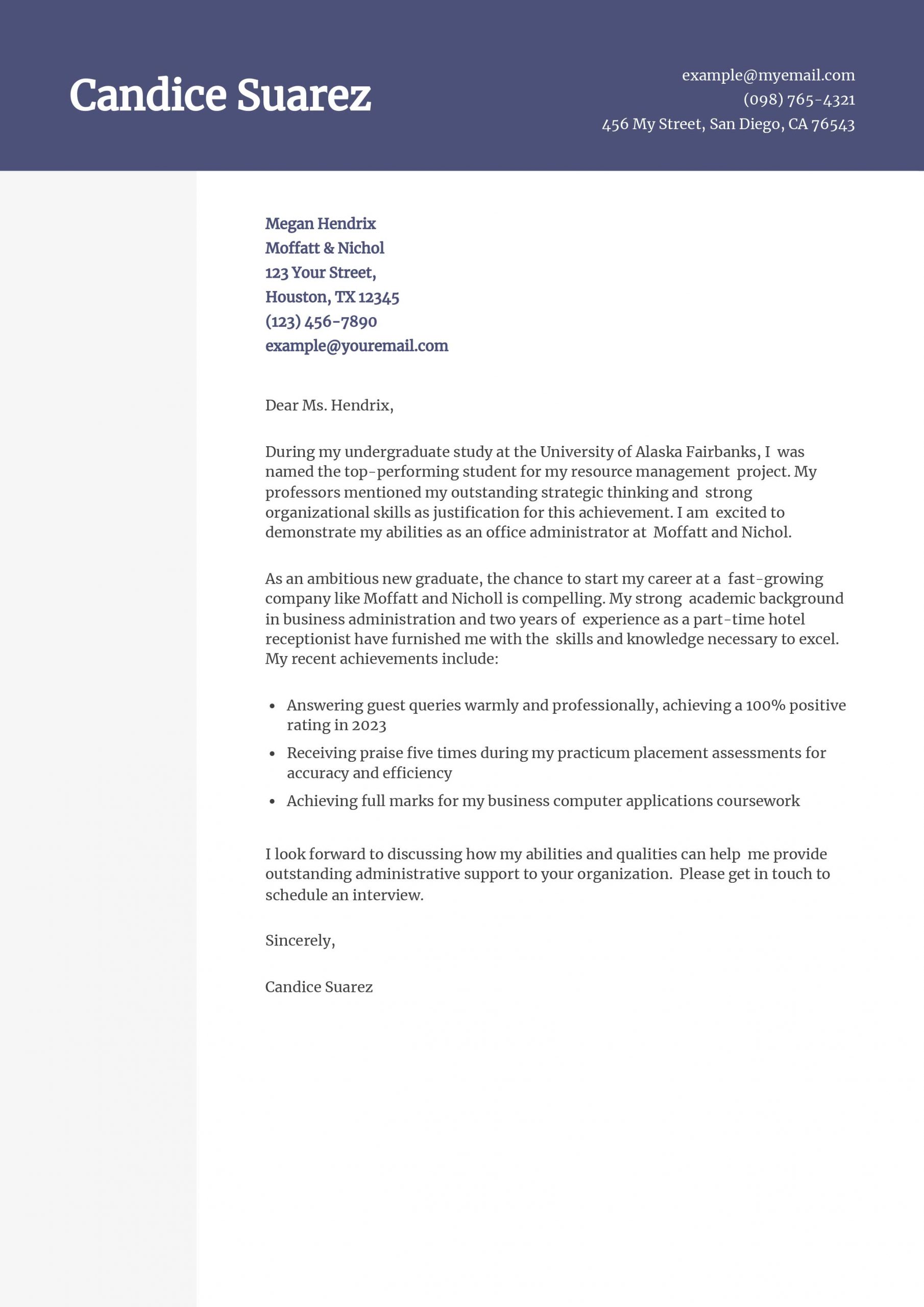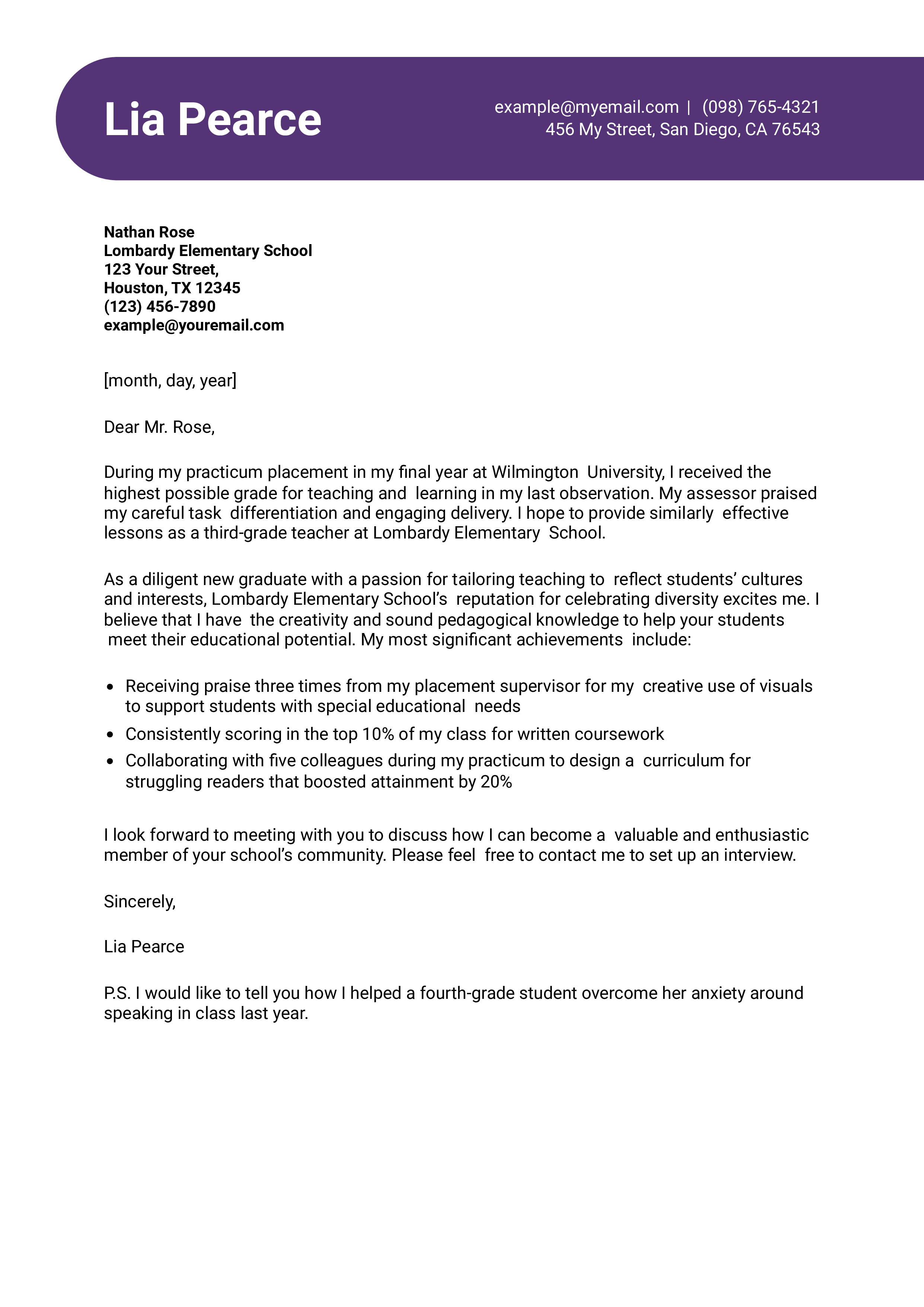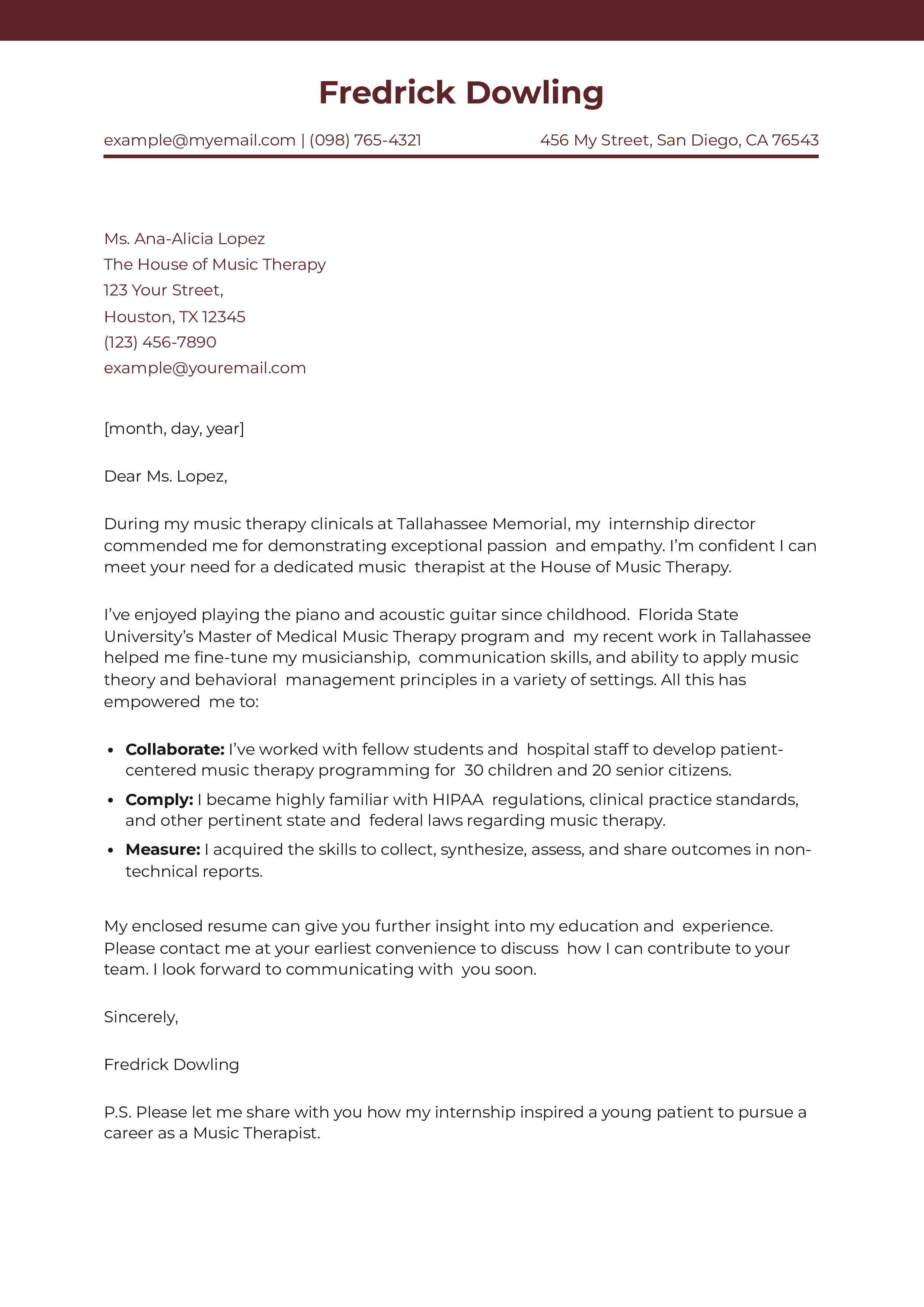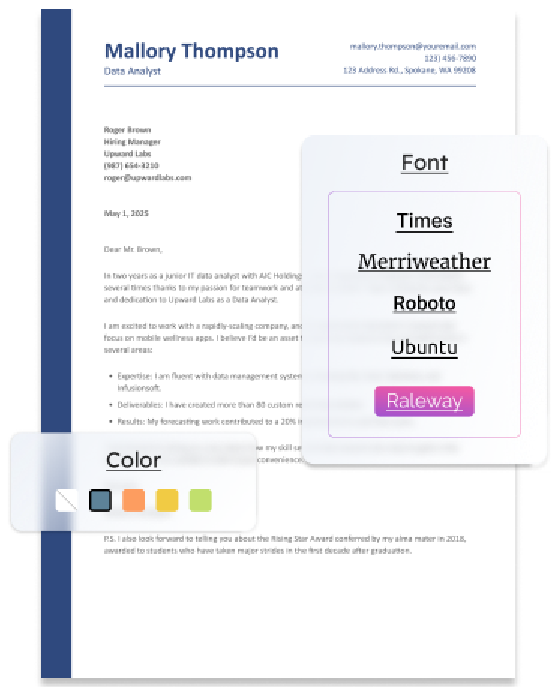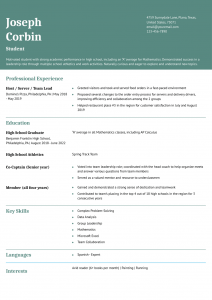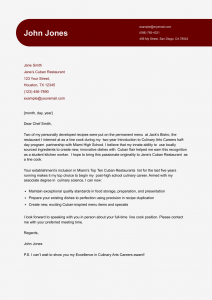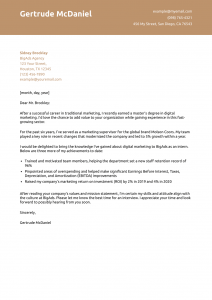When writing your college cover letter, focus on how your higher education or other experiences have prepared you for your target job. Express your interest in the employer, and cite relevant skills and qualities you’ve developed as a college student, such as research, creativity, or time management.
This guide will help you write a cover letter that gets you interviews for a job during or right after college.
College Cover Letter Templates and Examples
- Entry-Level
- Mid-Career
- Senior-Level
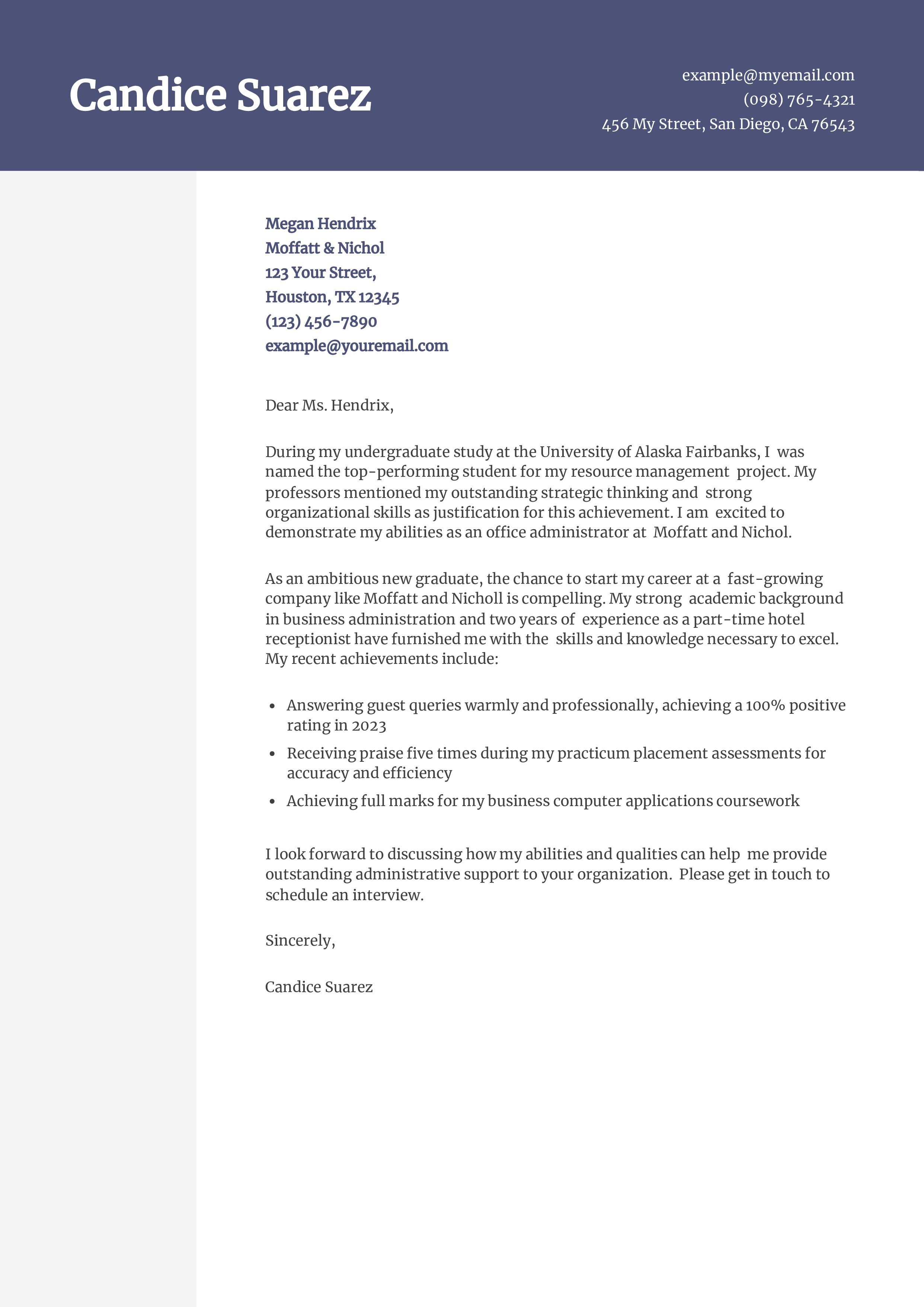
College Text-Only Cover Letter Templates and Examples
Candice Suarez
Business Administration Graduate | [email protected] | (887) 766-5544 | 432 My Road, Anchorage, AK 10203
April 23, 2024
Megan Hendrix
Senior Hiring Manager
Moffatt & Nichol
(432) 109-8765
[email protected]
Dear Ms. Hendrix,
During my undergraduate study at the University of Alaska Fairbanks, I was named the top-performing student for my resource management project. My professors mentioned my outstanding strategic thinking and strong organizational skills as justification for this achievement. I am excited to demonstrate my abilities as an office administrator at Moffatt and Nichol.
As an ambitious new graduate, the chance to start my career at a fast-growing company like Moffatt and Nicholl is compelling. My strong academic background in business administration and two years of experience as a part-time hotel receptionist have furnished me with the skills and knowledge necessary to excel. My recent achievements include:
- Answering guest queries warmly and professionally, achieving a 100% positive rating in 2023
- Receiving praise five times during my practicum placement assessments for accuracy and efficiency
- Achieving full marks for my business computer applications coursework
I look forward to discussing how my abilities and qualities can help me provide outstanding administrative support to your organization. Please get in touch to schedule an interview.
Sincerely,
Candice Suarez
How To Write a College Cover Letter
Good college cover letters set and maintain a clear focus. Even more than a resume, your cover letter should center on your top qualifications for the job opening at hand – whether or not those qualifications come from your degree program. In the following sections, we introduce the five main parts of a cover letter and explain how you can focus on each one effectively.
1. Heading
At the top of the page, include:
- Your resume contact header, which should give your full name, address, email, phone number, and LinkedIn or other social accounts if applicable
- The date
- The recipient’s name, title, organization, and contact information (when available)
Note: Feel free to add a professional title to your contact header, as in the example below. In many cases, you can copy over the title from your resume profile summary. By including a title, you’ll set a clear focus and show hiring managers you fall in the category of applicants they’re looking for.
Example
Lia Pearce
Teaching Graduate | [email protected] | (765) 432-1098 | 456 My Avenue, Wilmington, DE 54321
April 23, 2024
Nathan Rose
Principal
Lombardy Elementary School
(876) 543-2109
[email protected]
2. Salutation
Address your recipient by name as in the first example below – this is the quickest way to show you’re sending a job-specific letter and not a boilerplate. If you can’t find the person’s name, use a variation of “Dear Hiring Manager” so your greeting is still tailored somewhat to each job opening.
For traditional job applications, end your salutation line with a colon. But consider a comma instead if you know your recipient or the employer has a casual work culture (sometimes revealed by the job posting). In rare cases, you may also trade out the standard “Dear” for a more casual “Greetings,” “Hello,” “Hi,” or even “Good morning.” Use your discretion and take cues from the job posting or company website when possible.
Examples
Dear Ms. Hendrix,
Dear Moffatt & Nichol Hiring Manager:
3. “Hook” or introduction
Catch the reader’s attention by citing an achievement from your work history or a key credential the employer seeks in applicants. It’s fine to adapt a bullet highlight from your resume – in fact, a little repetition across documents can make your application more cohesive. But choose carefully. The highlight that opens your letter is often your very first impression on employers. Select one that’s impressive and relevant to the job so hiring managers can quickly envision you adding value to their company.
As an alternative to the work highlight approach, you can set yourself apart by networking. Begin your letter by citing any personal or professional connections you have with the hiring manager. If someone at the organization alerted you to the job, use a line like “I was excited to hear from your colleague [Name] about [Company’s]’s new [title] position.” Or, if you’ve already met your recipient, mention that with a line like “It was great speaking with you at the job fair last week.”
Example
During my music therapy clinicals at Tallahassee Memorial, my internship director commended me for demonstrating exceptional passion and empathy. I can meet your need for a dedicated music therapist at the House of Music Therapy.
4. Body paragraph(s)
Here’s where you can bring your cover letter into sharpest focus. Show the hiring manager you’re not just after this type of role, but this specific role at this particular organization. Read the job posting again closely, then write two or three sentences in response to it. What details about the job opening or employer caught your attention? Do you identify with the company’s stated mission or values? If so, how? Consider quoting text from the job posting that resonates with you.
Following this explanation, cite a few more of your skills or achievements, possibly as bullet points.
Example
As a diligent new graduate with a passion for tailoring teaching to reflect students’ cultures and interests, Lombardy Elementary School’s reputation for celebrating diversity excites me. I have the creativity and sound pedagogical knowledge to help your students meet their educational potential. My most significant achievements include:
- Receiving praise three times from my placement supervisor for my creative use of visuals to support students with special educational needs
- Consistently scoring in the top 10% of my class for written coursework
- Collaborating with five colleagues during my practicum to design a curriculum for struggling readers that boosted attainment by 20%
5. Conclusion
Finally, request an interview for the position. Consider briefly restating your core skills to carry the letter’s focus through the last paragraph. If you’re still in college, you can also use this section to provide any requested details on your course schedule and availability. To end your cover letter, use a simple closing like “Sincerely” or “Best regards” and then your name.
Example
I look forward to discussing how my abilities and qualities can help me provide outstanding administrative support to your organization. Please get in touch to schedule an interview.
Sincerely,
Candice Suarez
College Cover Letter Tips
1. Show you can excel in the position
Start your letter strong with an example of how you gained or applied skills relevant to the job. This example could come from your degree program – maybe you completed a successful academic project or earned a high grade point average (GPA) in your major. But it could also come from your work, internship, or volunteer experience.
Example
During my practicum placement in my final year at Wilmington University, I received the highest possible grade for teaching and learning in my last observation. My assessor praised my careful task differentiation and engaging delivery. I hope to provide similarly effective lessons as a third-grade teacher at Lombardy Elementary School.
2. Tell why you’re drawn to the opportunity
Show your interest in the hiring organization by describing your similar college, work, or other experiences. For instance, if you’re applying to a teaching job, maybe you share the school’s focus on adapting to students’ unique talents, as reflected by your dissertation topic. Or, if you’re applying for a job in hospitality, you could point to a recent internship that gave you related industry experience and service skills.
Example
As an ambitious new graduate, the chance to start my career at a fast-growing company like Moffatt and Nicholl is compelling. My strong academic background in business administration and two years of experience as a part-time hotel receptionist have furnished me with the skills and knowledge necessary to excel.
3. Highlight your related strengths
Add a short list of bullet points to demonstrate your skill and success in key work areas for your target job. As with the highlight that opens your cover letter, feel free to cite experiences in or outside your degree program. But also consider using this section to call out any relevant soft skills you’ve developed as a college student, such as diligence or collaboration.
Example
My recent achievements include:
- Answering guest queries warmly and professionally, achieving a 100% positive rating in 2023
- Receiving praise five times during my practicum placement assessments for accuracy and efficiency
- Achieving full marks for my business computer applications coursework
College Cover Letter Frequently Asked Questions
What happens if I don’t write a cover letter?-
You’ll hinder your ability to send applications or get interviews. Job postings today usually require or allow you to submit a cover letter along with your resume. While not every hiring manager reads or prioritizes them, a well-crafted letter can only help you stand out from other applicants. It will also help you clarify what points to emphasize during the interview.
What’s the most essential part of a cover letter?-
Any explanation you give for why the specific job opening or employer interests you. These details distinguish the cover letter from your resume and other application materials and can help you get past applicant tracking systems (ATS). They also set up a good interview discussion about how you fit the role and the organization’s work culture.
How should I format my cover letter?-
Like your resume. Carry over that document’s basic format settings, such as font style, line spacing, and page margins.
Craft a new cover letter in minutes
Get the attention of hiring managers with a cover letter tailored to every job application.
